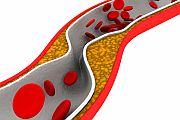Variability predicts increased risk in patients with coronary artery disease, independent of LDL-C levels
TUESDAY, April 14, 2015 (HealthDay News) — Visit-to-visit variability in low-density lipoprotein cholesterol (LDL-C) can independently predict cardiovascular events in individuals with coronary artery disease, according to a study published in the April 21 issue of the Journal of the American College of Cardiology.
Sripal Bangalore, M.D., from the New York University School of Medicine in New York City, and colleagues examined the role of visit-to-visit variability in LDL-C levels on cardiovascular outcomes. Patients enrolled in the Treating to New Targets trial were randomized to receive atorvastatin 80 mg/day versus 10 mg/day. Visit-to-visit LDL-C variability was evaluated from three months into randomization using different measures.
The researchers found that standard deviation (SD) and average successive variability (ASV) were significantly lower with atorvastatin 80 mg/day versus 10 mg/day among the 9,572 patients (P = 0.005 and P < 0.0001, respectively). Irrespective of treatment effect and achieved LDL-C levels, each one-SD increase in LDL-C variability (by ASV) correlated with increases in the risk of any coronary event (hazard ratio [HR], 1.16), any cardiovascular event (HR, 1.11), death (HR, 1.23), myocardial infarction (HR, 1.10), and stroke (HR, 1.17) in the adjusted model. After adjustment for medication adherence the results were largely consistent.
“In subjects with coronary artery disease, visit-to-visit LDL-C variability is an independent predictor of cardiovascular events,” the authors write.
Several authors disclosed financial ties, including employment, to pharmaceutical companies.
Full Text (subscription or payment may be required)
Editorial (subscription or payment may be required)
Copyright © 2015 HealthDay. All rights reserved.








